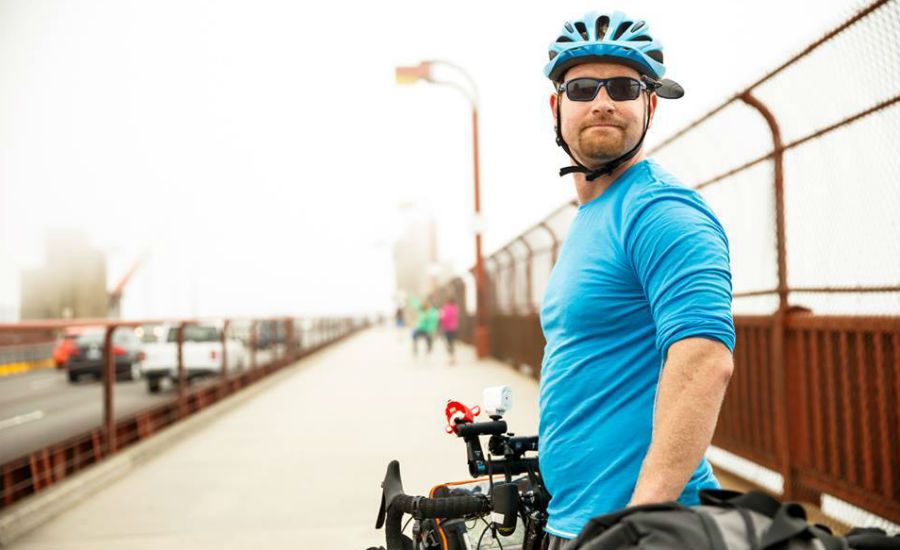In late May, Spencer Nee found himself at a campsite in Colorado talking to a woman he’d just met. She wasn’t vacationing; she was trying to wean herself off heroin. She was on her third day, dope sick and struggling to remember why sobriety seemed like a good idea. Nee can relate.
Although Nee is celebrating seven years of sobriety, he tells Guideposts.org his debilitating addiction to alcohol left him “in a really frightening place in my life. I’d pretty much accepted my death.”
Unlike the woman he met at the campsite, who grew up in the foster care system and survived childhood sexual abuse before becoming addicted to drugs, Nee came from a loving home. He excelled in sports and academics, graduated from college and owned a business for a time. He drank socially. Only after college, when his business fell through and his peers were successfully transitioning into adulthood, did his dependence on alcohol grow.
“I was self-medicating a lot of holes in my life,” Nee says. “A lot of anxiety and depression. [Alcohol] just slowly started to rule my life.”
His relationship with his parents deteriorated, and some friends disappeared. He couldn’t hold a job – Nee estimates he had seven in 2007 alone – and the jobs he did manage to snag were places where he could indulge his drinking.
Soon, he wasn’t able to afford his rent and became part of the “invisible population” of homeless people, sleeping in a tent in the woods next to his alma mater or spending a night in a dingy motel.
“I felt like a complete outcast, like I was a hassle to people,” he says about his time on the streets.
But the scariest part of his spiral into addiction was the toll it took on his health. Nee remembers the early days, waking up to his body shaking uncontrollably, desperately craving a drink.
“I’d wake up so shaky that I was afraid I’d go into a seizure and die without alcohol,” Nee says. “I’d have to drink in the mornings and at work. It just took over my life.”
READ MORE: ANNIE LOBERT FINDS REDEMPTION ON THE VEGAS STRIP
After one night of drinking, Nee fell asleep behind a dumpster and woke up to a stranger dumping trash on him. That rock bottom moment made the then 27-year-old realize he needed to get sober.
Nee called his parents to ask for help. It was the first time they’d heard from him in six months. That call led him to Providence Network in Denver.
The faith-based organization works to help homeless, addicted and at-risk men, women and families become healthy, productive members of society. The group offers transitional homes with faith-based counseling, life and job skills training and a live-in staff to ease recovering addicts and homeless people back into a normal life. For Nee, Providence Network was able to do what other homeless shelters and smaller programs couldn’t.
“I’m one of the lucky ones,” Nee says. “But I think [my sobriety] does say something about Providence Network in general. They have a really unique approach. You become a member of the community, you go out and get a job, you have your meals together, there’s a live-in staff. There’s just a feeling of family that I was really missing.”
Nee spent two years in one of the organization’s homes before moving into a “Victory House,” or sober living apartment. There Nee returned to school and became a registered nurse. Eventually, he was able to leave the transitional facility and continue sober living on his own.
“There are a lot of good people buried under addictions that lead them to homelessness, but with a little help, they can go on to live productive, healthy lives,” Nee says. He’s living proof. “They are people. They deserve love and respect.”
While working in the E.R. of a hospital in Colorado, Nee got the idea to show love for those with addictions in a new way.
“We were starting to get this major influx of kids overdosing, most hooked on heroin,” Nee explains. He did some research and found the number of homeless youth was rising, not only in Colorado, but across the nation. He felt compelled to help.
READ MORE: MY MOMENT OF TRUTH IN REHAB
Nee partnered with Providence Network to raise money for a new transitional home the organization was planning, one focused on youth and young adults. His plan: to bike 4,000 miles cross-country, from the Golden Gate Bridge in San Francisco to the Brooklyn Bridge in New York City to raise the $10,000 needed for the new housing unit. Staying at campsites, rehab centers, and transitional homes along the way, Nee shared his story of addiction, homelessness, recovery and faith to hundreds of people struggling with the same demons that once held him hostage—including the woman recovering from heroin addiction, with whom he’d kept in contact.
Roughly four months after he left the Golden Gate Bridge, Nee reached the finish line at the Brooklyn Bridge. As he rode over the East River, in a bustling crowd of tourists, he received a text message from the woman he’d met at the campsite.
She was 60 days sober, thanks to Nee’s words of encouragement.
“I wanted to spread the message of hope,” Nee says of his bridge-to-bridge ride. “I wanted to reach out to these people and show them that you can have fun when you’re sober, there is a life rich in adventures if you can just hang on.”






